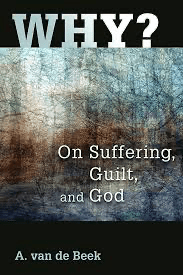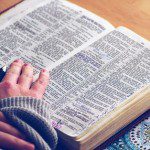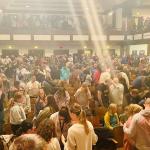“Why?” Chapter 19: Jesus Christ—God’s Choice
”God is a rough God, grim, and in our eyes even cruel. God does not have the refinement of a middle class European or American. … God is not one you can figure out.” (“Why? On Suffering, Guilt, and God,” p. 277)
I am sticking to one chapter this time, in this installment of my ongoing series of commentaries on this book by Abram van de Beek. Some of you are reading along with me. Others are just listening in on our conversations, which is fine. We are slowly reaching the end of the book. At the end of this installment I will announce what portion I will comment on here and when.
So, on to Chapter 19: “Jesus Christ—God’s Choice.” VdB here says “The fascination and difficulty in Christian theology is that we have to do with a much more variable conduct of God and a much broader revelation than fits our construals. We cannot get a hold of God. We cannot lock him in our systems, not even in a system of mercy and grace. Always and again, God is different.” (278) However, vdB then goes on to say there is a “fixed constant” in God and that is his faithfulness. “God does not act with absolute arbitrariness.” (279) And he states that with the Noahic flood and his promise never to do that again, God determined himself in a certain way and has never gone back on that. He has made decisions in history that shape his very being—by his own choice. (281) Increasingly, vdB says, God “turned toward grace and salvation, not with harmonious gradualism, but in the manner of the unpredictable God of the world, in a hopeless zigzag line.” (282)
Then vdB comes to his “big idea”—the one that determines FOR HIM all that we as Christians should think and know about God: Finally “the last decisive choice is made. That choice was made in Jesus Christ.” (282)
Perhaps there is no more startling and mind-blowing paragraph in this whole book than that at the bottom of 282 and top of 283. I can’t write it all out here. According to vdB, in Christ God chose forever to be the God of those who suffer and especially the God who forsook himself for us on the cross on which “the deity of God was at stake.” (283) (My theology professor Wolfhart Pannenberg used to say and write that—that God’s deity is at stake in history.)
”At the cross of Jesus, it is either all or nothing; a world is saved or a world is lost. Either God is the God of sinners or God loses his deity. … [But] God chooses Jesus as the light of the world. God raised him from the dead on the third day.” (284) There is so much in these pages and these paragraphs I would like to quote, but some of you read them and I await and look forward to your thoughts.
According to vdB, in Jesus Christ, his life, death and resurrection, “something essential has changed within God himself. God has changed. … A new relationship between God and human beings is initiated. When God enters a new relationship, something changes within himself as well.” (287) Now, “From within the deepest part of his being God proved to be love and wanted to be no other than love.” (291)
Jumping to the last page of the chapter (294): vdB claims that God’s decision to identify himself with Jesus Christ has ontological implications for God. God’s decision and action in time became true for God’s eternity, even backwards. (Echoes of Pannenberg!) “In Jesus Christ God elects himself.” (Echoes of Barth!) (294) and “Only now do people see who God has been from all eternity. Only now does it become clear who the Creator of the world is: Jesus Christ. Not only did it become known to humans; it also became known in God.” (294)
What to say about all this? What to say? Here is what I say: vdB is bold. I don’t know that I have ever read a more courageous theologian. Not necessarily right, but bold and courageous. How so? In making Jesus Christ definitive for God himself in time, in history, backwards and forwards, even for God’s own being in eternity. Time conditions eternity.
If I understand vdB at all correctly, we MUST understand God backwards from Jesus Christ or else we MUST have a God who is beyond any comprehension. Before Jesus Christ, if we can even talk that way, God was uncertain. God’s being as God was at stake, in question, doubtful. Then came Jesus Christ in whom God determined himself for time and eternity to be a God of love, grace, mercy, and salvation, a God of and for the suffering—in the suffering of his Son Jesus.
Simply put, if that’s possible, God is Jesus and Jesus is God and not just “in some manner of speaking” but ontologically. By God’s decision. And that decision was a self-binding one that cannot change. The way of Jesus Christ is the way of God. In Jesus Christ it became true, ontologically and not only epistemologically, that God was and is and always will be one with Jesus Christ. God solidified his character in such a way that even God’s “past” changed.
This chapter reminded me why this book shook me. I had been taught, at least from seminary on, that God is no anthropomorphic God but an ontologically perfect, unchanging, impassible, God with no real history. “Progressive revelation” was the answer to everything questionable about God in the biblical narrative that sweeps from chaos through creation to covenant to…. No ontological changes in God himself. I never really could accept that. I “tried on” process theology and found it depressing, a pathetic God without power. I looked at Calvinism and shuddered and turned away. I read Robert Jenson’s “God after God” and was awakened from my dogmatic but restless slumbering. I read Moltmann, Juengel, and studied with Pannenberg. I wrote my dissertation on Pannenberg’s “eschatological ontology.” I studied Hegel. I was intrigued but not sold. When I read vdB, though, some kind of seismic shift took place inside of me that’s hard to describe except with “Yes! Finally! A theologian who dares to say the not-so-obvious obvious!” Everything fell into place. Suddenly, I remembered the Bible stories I was taught as a child. I remembered the emphasis on Jesus as God. I remembered my confusion about the Old Testament God. I gulped and swallowed hard and read vdB again. Now I have read it (the book) a third time. I am fully aware of how far away from traditional “Christian theism” this is. Is it heresy? Maybe. Can I embrace it anyway? Maybe. My heart embraces it but my head keeps saying “No, this is too far out, too unorthodox, too bold.” Has vdB gone where no theologian has dared to go before? I think so. Do I like that? Yes. What do I like about it? The claim that God is Jesus Christ and that Jesus Christ is God, but without falling into modalism which I can’t in light of the biblical narrative of Father, Son and Holy Spirit.
Next I will take up Chapter 20: The Spirit Has Time” — in about a week to ten days.
*Note: If you comment, make sure your comment is relatively brief (no more than 100 words), on topic, addressed to me, civil and respectful (not hostile or argumentative) and devoid of pictures or links. If you have not read this chapter (Chapter 19), don’t comment. You may ask a question.*














